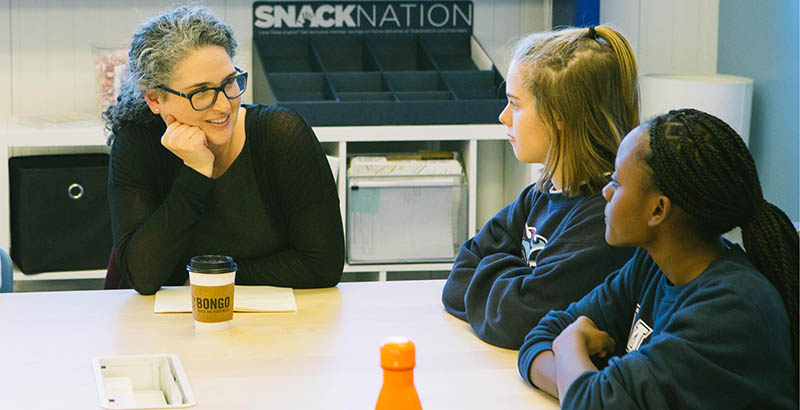Q&A — Three Minutes With CZI’s Brooke Stafford-Brizard: What the Schools Best at Supporting the Whole Child Have in Common

This is one in an ongoing series of brief conversations with education innovators led by Greg Richmond, founder and former CEO of the National Association of Charter School Authorizers. His “Three Questions For” series also appears on Medium. Today’s edition: three minutes with Brooke Stafford-Brizard of the Chan Zuckerberg Initiative.
Richmond: Recently, the Chan Zuckerberg Initiative released a set of profiles of schools bringing a whole-child approach to the classroom. What are the characteristics of those schools that make it more likely for them to successfully implement a whole-child approach?
Stafford-Brizard: One theme we have seen across those 10 schools that have really dedicated to this rigorous and integrated whole-child approach is really intentional model design. Whether they built the school design from the start or revisited the design of their model, it has to be embedded at that level to think about how a broader definition of student success is integrated into models that might have been more academic-centric alone. None of these schools walked away from rigorous academic development. Instead, many of these schools are really doing a phenomenal job with their academic measures, and their leaders attribute that to their whole-child approach.
Also, there is huge attention to the adult community in these schools. It’s in two parts. One is the access that teachers have to support and resources grounded in the latest research on child and adolescent development. We generally don’t train teachers in pre-service education through a human development lens. There is so much opportunity to support our educators with innovative resources grounded in child and adolescent development — for example, leveraging brain science and how that informs how we support positive discipline models in schools.
There’s the support educators need and are longing for, and then there is also attention to their own whole development. That’s supporting and tapping into the sense of purpose that educators feel, their own identities and what they bring to school in their classroom, as well as addressing levels of stress they might be experiencing. For example, in environments that are doing a really good job addressing trauma, we see significant secondary trauma in our teachers. A huge focus of the schools we highlighted is the attention to the teachers and their whole development.
I would also add a connection to families and community. A lot of these schools are really intentional about embracing and embedding the values and strengths and assets that students are bringing from their cultures and their communities into the classroom, and not putting barriers between the classroom and community.
These schools are also really desperate for formative measures and formative assessments, both to help track where they are and how they can get better. Some of these partners have built their own surveys and their own tools in the absence of fieldwide supports.
Finally, the whole-child work in these schools is implemented with deep rigor. Just like the effort that goes behind a strong approach to mathematics or literacy, the same thing is necessary with their approach on these whole-child constructs, like sense of purpose or executive function skills.
How could public education policies around the country be improved to make it more likely for schools to implement a whole-child approach?
In the policy space, we’re seeing really strong traction and response for demand for mental health supports in schools. We should ensure that those policies that are put in place and the funding routed toward those supports are looking to evidence-based practice and an asset-based lens on students and communities. At the Chan Zuckerberg Initiative, we include the assets and skills connected to mental health and well-being in an expanded definition of student success and have invested in supports for educators to integrate a focus on mental health into their school practice.
I would point to two main policy areas that are most available for opportunity. This first involves discipline policies and codes of conduct that should be grounded in the science of child and adolescent development and focused on strengths and social-emotional skill development. This includes the most relevant and effective strategies for de-escalating children and adolescents and addressing behaviors that might not be appropriate for the classroom — we know that isolation and immediate punishment is actually not aligned to the science of learning and development. Policies need to represent this science and provide the right implementation support for teachers and leaders.
A second opportunity involves adult development policies, both pre-service and in-service, and what we name as the critical components of educator preparation. The learning and developmental sciences have a lot to teach us about how to best support children, adolescents and adults. The implications are powerful both for teachers and our school leaders.
What has inspired you to make a career supporting and advancing a whole-child approach to education?
I started my career as a middle school teacher in the Bronx. I was a Teach for America corps member. I wasn’t an education major. I went back to graduate school after I taught middle school, and the program I focused on was cognitive sciences in education, a doctoral program in human development that was part of Teachers College at Columbia, and I learned the science of learning and development. There was so much that I wish I had known as a teacher. My work and my career have been about infusing the science of human development into the way we work with educators and support educators.
Greg Richmond is the founder of the National Association of Charter School Authorizers and a senior fellow at the Future Ed think tank at Georgetown University.
Disclosure: The Chan Zuckerberg Initiative provides financial support to The 74.
Get stories like these delivered straight to your inbox. Sign up for The 74 Newsletter

;)
